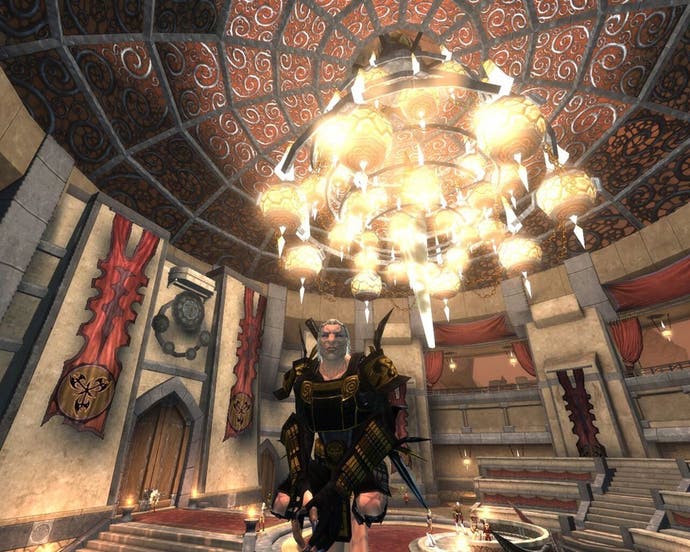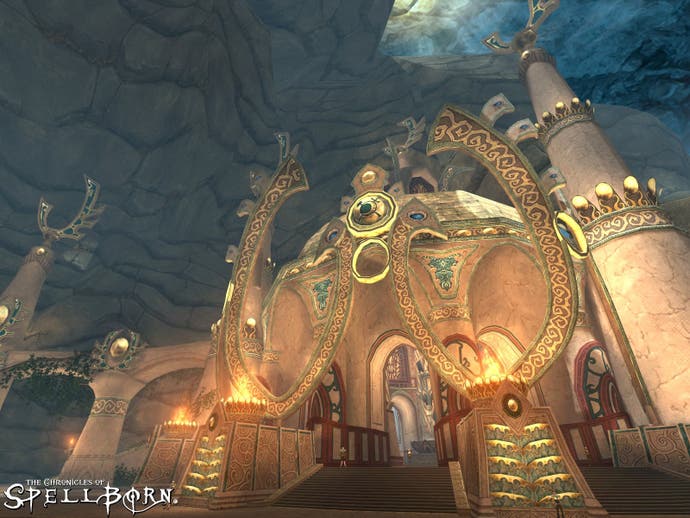The Chronicles of Spellborn
A dodgy new MMO. In a good way.
There's a fatalistic sense of Daniel and the lion about what Spellborn International is set to do. World of Warcraft: Wrath of the Lich King to one side, Warhammer Online to the other, and a compelling line-up of single-player games flooding the shops, and The Chronicles of Spellborn is out on 27th November. Actually, it's like watching those YouTube videos where a curious mouse runs around a glass tank, but you know there's a tarantula in that hollow log.
Perhaps not. If Chronicles of Spellborn were another WOW clone, we'd have no illusions about its imminent crushing, but it's not. Let's consider some of the headlines. The first thing that strikes you is right on the character-creation screen - where, unusually, you get to select your armour and weapons from a pretty broad range of options. Unusually, you can pick from the same pools of armour and weapons no matter which class archetype you select - Rogue, Warrior or Mage.
This is because armour and weapons don't have statistics associated with them. They're entirely cosmetic - and while you gain access to elaborate and attractive items as you progress, the choice of armour to use rests entirely with your fashion sense. Instead, equipment has slots for Sigils (at present, only weapons and jewelry have these slots, but this will be extended to armour as well), add-ons that affect your character's statistics. These Sigils can be equipped to an item, and easily moved to another if you want to change your look.

Another unusual aspect is the stats involved. Spellborn is missing an entire class of standard MMORPG statistics - specifically, anything to do with hit or dodge ratings. The game's dispensed with behind-the-scenes dice rolls entirely. Taking its cue from action games, it lets players and NPCs alike properly target their attacks instead. If you want to hit an enemy, you need to be targeting him properly; if you want to dodge an attack, you just dive out of the way. It turns combat into a fast-paced and exciting affair, where you need to keep moving around to avoid enemy attacks while positioning yourself to pummel foes. Many attacks (especially on the Rogue archetype, and its three sub-classes) are more powerful delivered to the back, so you spend a lot of time trying to get behind your enemies.
Where this really comes into its own is in the game's assortment of buffs and debuffs. Many attacks deliver an associated debuff - and many of those debuffs affect an enemy's movement speed, which prevents them from dodging or avoiding rear attacks quite so effectively. In player-versus-player combat this becomes crucial, since a target who's unable to move as fast as you is essentially a sitting duck.
The buff and debuff system has also allowed Spellborn to innovate in other ways. For a start, there's the game's atypical approach to healing. While one class does have a direct healing spell, every single class has access to healing of some kind - and it's often by means of a buff or debuff, such as one applied to an enemy which heals the attacker with each successful blow. The result is that groups don't necessarily need a "priest" class in their mix, as long as everyone knows what they're doing with the healing powers available to them. It's another factor that contributes to the pace, with most healing dependent on staying in the thick of battle.

It's also worth mentioning the game's AI. After a few hours of play you notice that Spellborn's foes don't behave like anything else you've seen in an MMORPG. For a start, they dodge and weave to avoid your attacks, which is understandable given the game's decision not to have any dice-roll based avoidance. And there are other, subtler things going on here too. We noticed this first when a wolf started running away even though we'd only hit it a couple of times. Suspecting a bug, we ran after it. We blundered through a bush after the wolf - only to discover ourselves surrounded by four more wolves, to whom the original target had deliberately led us. Clever girl.
Human targets are more intelligent still. They normally come in a group of varied classes - a mage with a handful of melee types, typically - and they adapt intelligently to your strategies as well as to the make-up of your own party. If you stand back and fling arrows and ranged attacks, the melee classes stand in front of the caster to shield him while he returns the favour. Charge in, and they deliberately target your own caster classes to reduce your group's damage output. Leading you away from whatever or whoever they're protecting, and towards more groups of enemies, is also on the cards.


